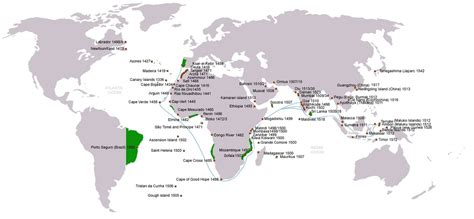Portugal’s trading post empire was a vast network of trading posts and colonies established by the Portuguese Empire during the Age of Exploration. It was one of the first and largest global empires, spanning from Brazil to Japan.

Origins and Expansion
Portugal began establishing trading posts in the 15th century, primarily along the coasts of Africa and Asia. The Portuguese were motivated by the desire for spices, gold, and other valuable resources. In 1498, Vasco da Gama reached India, opening up a new sea route to the East.
Over the next decades, Portugal established trading posts in Mozambique, Angola, India, China, and Japan. These posts served as centers for trade, diplomacy, and exploration. The Portuguese also established colonies in Brazil, where they established sugar plantations.
Economic Impact
The Portuguese trading post empire had a significant impact on the global economy. Portugal became one of the wealthiest and most powerful nations in Europe. The empire brought vast amounts of wealth to Portugal, including gold, silver, spices, and other resources.
The influx of wealth stimulated the Portuguese economy and led to a surge in trade and commerce. Lisbon became a major trading center, connecting Europe with Asia and Africa.
Social and Cultural Impact
The Portuguese trading post empire also had a profound social and cultural impact. The Portuguese brought their language, religion, and customs to the territories they colonized. This led to the spread of Portuguese culture around the world.
The Portuguese empire also facilitated the exchange of ideas and knowledge between different cultures. Portuguese explorers and traders brought back new plants, animals, and technologies from the lands they visited. These exchanges had a lasting impact on the development of European and Asian civilizations.
Decline and Fall
The Portuguese trading post empire began to decline in the 17th century. The Portuguese faced competition from other European powers, such as Spain, England, and the Netherlands. These powers established their own trading posts and colonies, challenging Portugal’s dominance.
In addition, the rise of the spice trade in the East Indies weakened the importance of Portugal’s trading posts in Africa and Asia. By the 18th century, Portugal had lost much of its empire.
Legacy
The Portuguese trading post empire left a lasting legacy on the world. The Portuguese language is still spoken in many countries around the globe, including Brazil, Angola, and Mozambique. Portuguese culture has also had a significant impact on the cultures of these countries.
The Portuguese trading post empire was a major chapter in the history of globalization. It connected different parts of the world and facilitated the exchange of goods, ideas, and culture. Its legacy continues to shape the world today.
Key Facts and Figures
- The Portuguese trading post empire was the first global empire.
- It spanned from Brazil to Japan.
- Portugal established over 50 trading posts and colonies.
- The empire brought vast amounts of wealth to Portugal.
- The Portuguese language is still spoken in many countries around the world.
FAQs
Q: When did Portugal establish its first trading post?
A: Portugal established its first trading post in Ceuta, Morocco in 1415.
Q: What was the most important Portuguese trading post?
A: Goa, India was the most important Portuguese trading post in Asia.
Q: Why did the Portuguese trading post empire decline?
A: The Portuguese trading post empire declined due to competition from other European powers and the rise of the spice trade in the East Indies.
Q: What is the legacy of the Portuguese trading post empire?
A: The Portuguese trading post empire left a lasting legacy on the world, including the spread of the Portuguese language, culture, and ideas.
